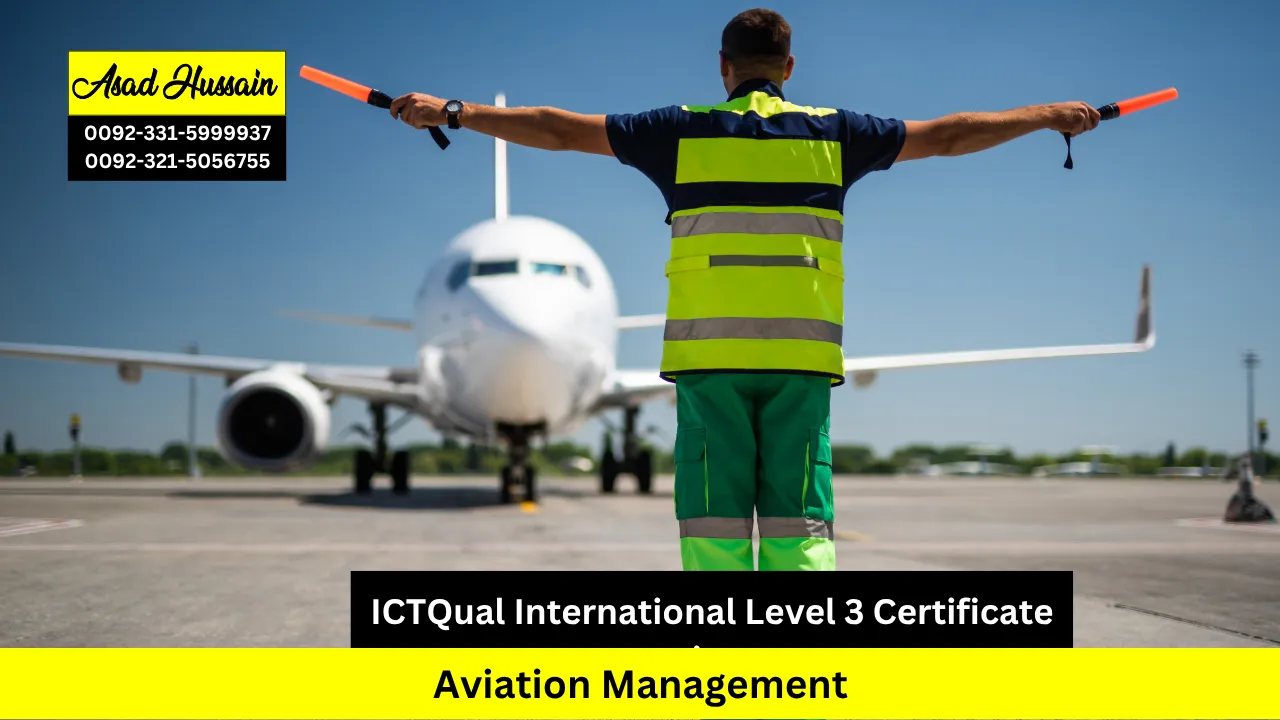The ICTQual International Level 3 Certificate in Aviation Management is a globally recognized qualification designed to equip learners with the knowledge and skills required to succeed in the dynamic aviation industry. Positioned at Level 3, this certificate builds on foundational aviation knowledge and introduces learners to more advanced concepts in airport operations, airline management, aviation safety, and customer service excellence. It is the perfect choice for individuals who want to progress from entry‑level aviation roles or strengthen their academic profile for higher‑level qualifications.
This program provides a comprehensive understanding of how airports and airlines operate in a highly regulated and competitive environment. Learners explore the interconnected functions of aviation organizations, gaining insights into how operational efficiency, safety standards, and passenger satisfaction combine to create a seamless travel experience. The course emphasizes both technical expertise and soft skills, ensuring graduates are prepared for supervisory and management responsibilities in aviation.
The qualification is particularly valuable for current airport and airline staff, travel and tourism graduates, and career changers who want to specialize in aviation management. By completing this program, learners enhance their employability and open doors to diverse career opportunities such as passenger services, ground operations, airline coordination, and airport administration. With its international recognition, the certificate also provides flexibility for learners seeking careers in different countries.
Ultimately, the ICTQual International Level 3 Certificate in Aviation Management is more than just a qualification—it is a career accelerator. It equips learners with the confidence, competence, and leadership skills needed to thrive in one of the world’s most exciting industries. Whether your goal is to advance in your current role, transition into aviation, or prepare for higher studies, this program provides the foundation for long‑term success in global aviation management..
Program Highlights
Mandatory Units
This qualification, the ICTQual International Level 3 Certificate in Aviation Management, consists of 3 mandatory units.
- Principles of Aviation Industry and Global Connectivity
- Airline and Airport Operations Management
- Aviation Safety, Security, and Service Standards
The ICTQual International Level 3 Certificate in Aviation Management is designed to be accessible while ensuring learners have the right foundation to succeed. Below are the typical entry requirements:
- Age Requirement: Learners should be 16 years of age or older at the time of enrollment.
- Educational Background: A secondary school qualification or equivalent (such as O‑Levels, GCSEs, or Matriculation) is generally expected.
- Language Proficiency: Since the course is delivered in English, learners should have at least a good command of English (reading, writing, and speaking) to understand aviation terminology and complete assessments.
- Prior Knowledge: While no advanced aviation experience is required, learners are expected to have a basic understanding of business, customer service, or aviation concepts. Completion of a Level 2 qualification in aviation, travel, or a related field is recommended but not mandatory.
- Work Experience (Optional): Individuals already working in airports, airlines, or related industries may benefit from their practical experience, but the course is equally open to newcomers who want to enter the aviation sector.
Learning Outcomes for the ICTQual International Level 3 Certificate in Aviation Management:
1. Principles of Aviation Industry and Global Connectivity
By the end of this unit, learners will be able to:
- Explain the structure and scope of the global aviation industry.
- Identify the role of international organisations (e.g., ICAO, IATA) in regulating aviation.
- Analyse how aviation supports global trade, tourism, and economic development.
- Describe the interconnectivity between airlines, airports, and allied industries.
- Recognise the impact of globalisation on aviation growth and passenger demand.
- Demonstrate awareness of emerging markets and international aviation hubs.
- Evaluate the contribution of aviation to cultural exchange and global mobility.
- Apply industry terminology to describe aviation’s role in global connectivity.
2. Airline and Airport Operations Management
By the end of this unit, learners will be able to:
- Describe the key operational functions of airlines and airports.
- Explain the processes involved in flight scheduling, fleet management, and route planning.
- Analyse the coordination between airlines, airports, and ground handling services.
- Demonstrate understanding of passenger flow management and service delivery.
- Recognise the importance of technology in supporting airline and airport operations.
- Evaluate the impact of operational efficiency on customer satisfaction and profitability.
- Identify challenges in managing delays, disruptions, and resource allocation.
- Apply operational concepts to real‑world aviation management scenarios.
3. Aviation Safety, Security, and Service Standards
By the end of this unit, learners will be able to:
- Explain the principles of aviation safety and their importance to industry operations.
- Identify international safety and security regulations governing aviation.
- Demonstrate awareness of emergency procedures and contingency planning.
- Analyse the relationship between safety, security, and customer service.
- Recognise the role of staff in maintaining compliance with safety standards.
- Evaluate the impact of security measures on passenger experience.
- Apply communication and service skills to support safe and efficient operations.
- Appreciate the ethical and professional responsibilities linked to aviation safety and service.
The ICTQual International Level 3 Certificate in Aviation Management is designed for learners who want to advance their knowledge and skills in the aviation industry. This qualification is ideal for those looking to progress from entry‑level roles, strengthen their academic profile, or prepare for supervisory and management responsibilities. With its international recognition, the course is suitable for a wide range of learners who aspire to build successful careers in airports, airlines, and aviation service providers.
1. Aspiring Aviation Professionals
- Individuals aiming to start a career in aviation management.
- Learners who want to understand advanced airport and airline operations.
- Those seeking a globally recognized qualification in aviation.
- Students looking for a structured entry into the aviation industry.
- People motivated to build long‑term careers in aviation.
2. Current Airport and Airline Staff
- Employees working in airports or airlines who want career progression.
- Staff in ground handling, passenger services, or security roles.
- Professionals aiming to move into supervisory or management positions.
- Workers seeking to broaden their knowledge beyond their current role.
- Aviation staff who want international recognition of their skills.
3. Travel, Tourism, and Hospitality Graduates
- Graduates who want to specialize in aviation management.
- Learners looking to bridge tourism, hospitality, and aviation industries.
- Individuals seeking to diversify their career opportunities.
- Those who want to add a professional aviation qualification to their CV.
- Graduates aiming for roles in airports, airlines, or aviation services.
4. Career Changers and Professionals
- Professionals from other industries passionate about aviation.
- Individuals with backgrounds in business, logistics, or customer service.
- Career changers seeking a structured pathway into aviation.
- People looking for a qualification that supports international mobility.
- Professionals aiming to transition into a high‑demand global sector.
5. Ambitious Learners Seeking Growth
- Individuals motivated to develop leadership and management skills.
- Learners who want to strengthen communication and problem‑solving abilities.
- Those preparing for high‑responsibility roles in aviation operations.
- People who want to gain confidence in managing complex environments.
- Learners aiming to position themselves as valuable assets in aviation.







